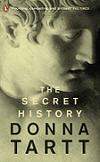 Nothing I can say about this book can possibly do it justice- it is just THAT good. As far as 'mature, adult' books go, this stands as high as His Dark Materials does on the 'young adult/children's' pedestal for me.
Nothing I can say about this book can possibly do it justice- it is just THAT good. As far as 'mature, adult' books go, this stands as high as His Dark Materials does on the 'young adult/children's' pedestal for me.The story is a recollection of past events by the main character, Richard Papen whose life undergoes a dramatic change when he enrols in Hampden college, where he enters a Grecian classics class which is, as far as when the story begins, exclusive to only five other people- Henry, the 'leader' of the pack, Francis the metro/homo-sexual, Charles and Camilla who are twins, and Edmund (more affectionately known as 'Bunny'), who is effectively one of the most annoying characters I have ever run across in a novel before. The class is so exclusive that before Richard, their mentor, Julian has never taken in any other students before- not counting the fact that entering that particular class entails dropping every other subject. The main character, who comes from a less-than-wealthy family in California finds himself living a charade, trying to fit in with these intellectual and rich students. This circle of six end up isolating themselves from the rest of the college population, somehow bound together by an invisible thread that starts to unravel the moment murder is brought into the equation.
This is a gripping story of close friendships, betrayal, and the darkness hidden in the human soul. The events in this story are as unpredictable and sudden as life itself, and on the whole it represents the human struggle to escape that degree of 'self', to be free. In an attempt to escape 'themselves' through a bacchanal, they end up unwittingly killing an innocent man, and ironically, they end up writing themselves as characters in what can only be described as a tragedy.
‘Our own selves make us most unhappy, and that’s why we’re so anxious to lose them, don’t you think? Remember the Erinyes?’
‘Exactly. And how did they drive people mad? They turned up the volume of the inner monologue, magnified qualities already present to great excess, made people so much themselves that they couldn’t stand it.’
The effects of each moment recollected by the narrator is magnified by the masterful language and style of the author. The story varies quickly from being gloomy, vivid, dreamy and ironically funny (though not unappropriately so) at some points. We share the intimate bond the narrator shares with his friends, and yet there is always the underlying reminder that he doesn't really know them at all. They are almost like ghosts, drawn together by a single event which keeps them in its firm grip. There is a sense of disillusionment throughout the book, especially with Henry, which reminds us that in life, we never really know the true motives of the things the people around us do, even if they are our friends.
Later we are witness to the change in their behaviors and the helplessness of anyone to lessen their distress. The power of the Furies is at large, and the forces between them are becoming more and more scrambled. Extreme states of victimisation and paranoia are even reached when friends seem like enemies and shadows lurk where there are none (the secret histories of others). This ties with the central act of the motive for the bacchanal, almost as if the attempt to break the fact of their isolated selves is what entails their downfall, for trying to deny a certain central element in their tragedy.
All in all, this book is a wonderful read. Superbly written and chilling to the core, I give it a perfect score. (ooh, it rhymes!)
No comments:
Post a Comment